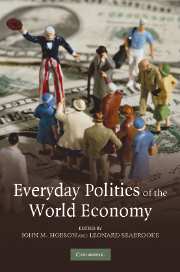1 - Everyday IPE: revealing everyday forms of change in the world economy
Published online by Cambridge University Press: 22 September 2009
Summary
[T]he period of relative calm in the world political economy in the second half of the 1980s was used by many scholars as an opportunity for strengthening the scholastic rigor of IPE without questioning its, often unstated, foundations. Many of us have not been particularly open to rearranging the hierarchy of the substantive issues that IPE studies, nor have we been happy to muck about with the hierarchy of values attached to those issues.
(Murphy and Tooze 1991b: 5)While the general method of analysis is well-established and widely accepted, this hardly means that IPE has exhausted its potential. In fact, it is surprising how narrow is the range of analytical and empirical problems that existing scholarship has tackled in earnest … It may be that a great deal of theoretical, analytical, and methodological brush needs to be cleared.
(Frieden and Martin 2002: 146)Our everyday actions have important consequences for the constitution and transformation of the local, national, regional and global contexts. How, what and with whom we spend, save, invest, buy and produce in our ordinary lives shapes markets and how states choose to intervene in them. The political, economic and social networks with which we associate ourselves provide us not only with meaning about how we think economic policy is made, but also constitute vehicles for how economic policy, both at home and abroad, should be made.
- Type
- Chapter
- Information
- Everyday Politics of the World Economy , pp. 1 - 24Publisher: Cambridge University PressPrint publication year: 2007
- 4
- Cited by

